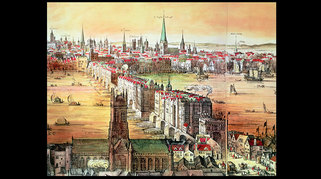 what bad event might have happened here? what bad event might have happened here? Since my first novel, A Murder at Rosamund’s Gate, was published in 2013, I have gotten many questions about my writing process. “Are you a plotter or a pantser?” is the question I most often get. Back then, I didn’t even know what the question meant. Now I know the questioner wants to know whether I outline my books in elaborate detail before I start writing (plotting), or do I go by the seat of my pants (pantsing), figuring out the plot and details as I go. I want to say that I’m usually captivated by an opening image—and that’s what my story revolves around. For my first novel, I have a young woman walking innocently up to a man she knows, who then surprises her by sticking a knife in her gut. Who was this woman? Why did she trust this man? And of course, why did he kill her? (Ironically, the image that inspired A Murder at Rosamund’s Gate never even made it into the final version. I had written it as a prologue, but I worried about starting the story twice. You can check it out here, if you are interested.). However, I've now learned that some things truly need to be figured out before I start writing the book. As I start my fourth Lucy Campion novel, I thought I'd try to share something of my process of thinking through the plot. I have my opening image, and--for now--a one paragraph description of the plot: When the niece of one of Master Hargrave’s high-ranking friends is found on London Bridge, huddled near a pool of blood, traumatized and unable to speak, Lucy Campion, printer’s apprentice, is enlisted to serve temporarily as the young woman’s companion. As she recovers over the month of April 1667, the woman begins—with Lucy’s help—to reconstruct a terrible event that occurred on the bridge. When the woman is attacked while in her care, Lucy becomes unwillingly privy to a plot with far-reaching political implications. So I have my opening image, but now I have to start thinking through all the big questions. Initially, I seem to do this as a reader. Who is this woman? What happened to her? What was this terrible event? Was it something that she witnessed, or is she physically injured. Whose blood is it? Why is she on London Bridge alone?
Then I will start the hard part--thinking through these questions as a writer. I've definitely learned that I need to figure out who the antagonist is from the outset. My natural tendency is to reveal the story to myself (pantsing), probably because I'm naturally more interested in how terrible events affect a community, not why people do terrible things. However, that approach usually means I don't know whodunnit, and that's a challenge for a mystery writer! I usually have to do a lot of backtracking and rethinking motivations and actions, when I have not worked out who the killer is upfront. So then, my next set of questions will be plot-related. What is this terrible event that occurred? Why did it happen? Who caused it to happen? How did this young noblewoman get involved in such a thing? And--sadly enough--I need to figure out if the London Bridge will work as a backdrop. I know it got burnt in the Great Fire, but I'm not sure yet how feasible it is that she ends up there. Then, because Lucy needs to be brought in, I need to figure out what makes this so urgent. Will this woman be attacked under Lucy's care? Probably. Why? What does she know? What are the larger implications of this crime. So, over the next week or so, I will brainstorm these big questions, and from there--voila!--a plot of sorts will emerge for me. I will figure out anchor points, motivations, and subplots from there. Then I will start writing. Every time I hit a roadblock, I will just start the questioning process again, until I figure out the direction I need to take to move forward. So I will call my approach, Plot-Pantsing. What about you? If you are a writer, what approach do you prefer? As a reader, do you think you can tell which approach a writer took?
1 Comment
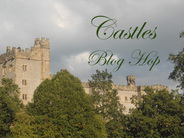 Today, I'm taking part in a "blog hop" celebrating the launch of Castles, Customs and Kings, a compilation of essays from the English Historical Fiction Authors blog. If you go to the blog, you can enter for a chance to win a free copy! "Read the history behind the fiction and discover the true tales surrounding England's castles, customs, and kings." --Official excerpt 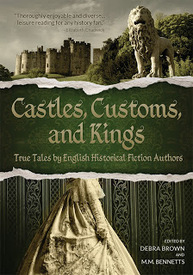 I have a piece in here about the political activities of Quaker women, who spent a lot of time speaking against the King. But today, since a number of bloggers are discussing palaces and castles, I thought I would write about my personal experience living near the ruins of Winchester Palace in London. *********************************************************************************** 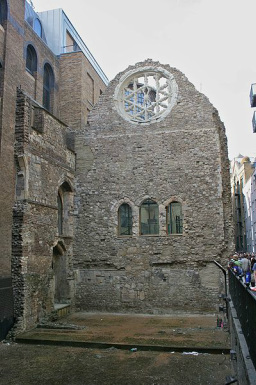 Photo: Mike Peel. 2009. www.mikepeel.net Photo: Mike Peel. 2009. www.mikepeel.net When I was a pirate serving aboard the Golden Hinde, the museum replica of Sir Francis Drake's ship dry-docked in the Thames--(okay, I was a tour guide or 'living history interpreter')--I spent a lot of time gazing at the ruins of Winchester Palace. Located in Southwark, near Shakespeare's Globe, the Clink and the Anchor (most fun pub in London), the ruins of the 13th century Winchester Palace loom incongruously from a modern parking garage (Car park!) 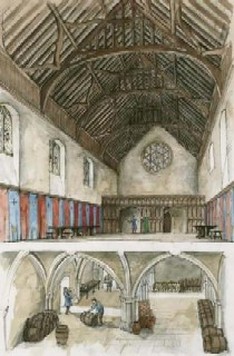 Liam Wales © Eng. Her. Photo Library Liam Wales © Eng. Her. Photo Library Not to be confused with the more illustrious Winchester Castle--or Winchester Cathedral, as many a dismayed tourist has done—Winchester Palace was founded by Bishop Henry de Blois, brother of King Stephen, in the early 13th century. It was designed to serve as a place for visiting bishops to stay when they journeyed to London. According to the English Heritage website, the Palace once consisted of a Great Hall, which led to a buttery, pantry and kitchen. In its late medieval heyday, the Palace had been a site of great spectacle, feasts and grand dinners, even have hosted the wedding dinner of James I of Scotland and Joan Beauford in 1424. The majestic qualities of the palace are suggested by the presence of a rose window, a common feature of more lavish churches and palaces built in this time. There is also evidence that the palace had a tennis court, bowling alley and pleasure gardens, to keep the bishops entertained while on royal and administrative business. Underneath the hall was a vaulted wine cellar, no doubt full of great vats and bottles to keep the bishops and their guests merry. There was also a passageway to the river wharf along the south bank of the Thames, to bring supplies into the Palace. The palace seems to have been surrounded around two courtyards, a brew-house and butchery. The Clink prison, under the auspices of the Bishop of Winchester, was also nearby. (Yes, this is where we get the phrase being ‘thrown in the clink.’) 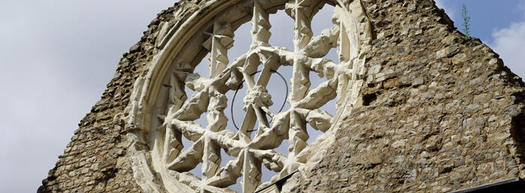 The Rose Window http://www.english-heritage.org.uk The Rose Window http://www.english-heritage.org.uk After the Reformation and King Henry VIII’s dissolution of many church properties, the palace changed its purpose. By the 17th century it was divided into tenements and warehouses. In the 19th century, much of the palace was destroyed in a fire in 1814. The ruins remained in disrepair until the 1980s when the area began to be redeveloped. Now only the bare remains and beautiful rose window suggest the former grandeur of the Palace. When I used to lead school children on tours of the ship, we’d often pause by the Palace ruins. There, I couldn’t help but whisper about the mysterious happenings the Golden Hinde crew had all witnessed during our long moonlit stints on ship watch... A shadow moving slowly through the grounds, when the source of the movement could not be detected.... A flock of black birds, arrayed in a perfect circle, as if convened at a great table.... And most odd of all: one night, our whole crew heard the strands of a madrigal being sung from deep within the ruins...By the time one of us mustered up the courage to peer over the guardrail, the unknown singers had vanished. To this day, I sometimes wonder who those anonymous singers were... But that's the intriguing romance and mystery of the ruins of Winchester Palace.... Guest Post in Writer's Digest: Balancing authenticity and accuracy while writing historical fiction9/8/2013 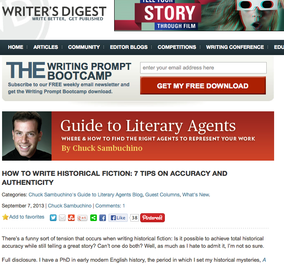 My post in WD appeared Sept 6, 2013 My post in WD appeared Sept 6, 2013 A few years ago, when I was first trying to figure out how to get my debut novel A Murder at Rosamund's Gate published, I came across Writer's Digest. Full of advice for the fledgling writer and published author alike, Writer's Digest gave me some great insights into what I needed to do to polish my manuscript and write a compelling cover letter. (I mean, tell me it's not important to know "How to see your work through an agent or publisher's eyes?" or, "Knowing when to stop: Expectations for a satisfying ending.") So I really appreciated the opportunity to write a guest post, "How to write historical fiction: 7 tips on accuracy and authenticity" for Writer's Digest. In this post, I talk about the tensions I've experienced as a historian-turned-novelist, while writing historical fiction. I also try to offer a few strategies that have worked for me in reconciling these tensions. Check it out! And while you're there, try out the daily writing prompt! Although I have to giggle, because today the prompt is: "You are a local news reporter for a failing network. Your boss tells you to ramp up the news by getting “creative” and constructing your own stories. What’s the first fake news story you create and broadcast on air?" Fake News! Totally fun! Accuracy Shmackeracy! If you do take up the challenge, will you post it here too? I'd love to see it!  I've been running into a funny problem while reflecting on the edits for my second Lucy Campion mystery (From the Charred Remains, out in April 2014!). It's the same problem I encountered when talking to a book group tonight... I'm having some trouble keeping the details of my stories straight. Crazy, right? How can I not know my own stories? I spent YEARS writing them (at least A Murder at Rosamund's Gate.) But still, I have notes and charts and timelines and figures (yes, figures!) detailing subplots, tracking character motivations, etc. And yet, I'm still a bit confused sometimes. How is this possible? So I raised the question of my faulty memory with my chief psychological consultant (literally my resident psychologist, a.k.a my alpha reader). "I wrote the darn thing!" I whined, er, lamented. "How can I not remember all these details? I shouldn't have to re-read my notes to know my own story. Do I just have the worst memory in the world?" And, with a lift of his eyebrow and a stroke to his goatee, my cognitive psychologist replied, "Ah, well let me tell you about a little thing we in the field like to call PROACTIVE INTERFERENCE." And here's what he explained: "I'd imagine it's always harder for the writer to remember the details than it is for a reader. For the reader, there is one reality and it is laid out there on the page. The writer, however, has vividly imagined (and discarded) many realities. These early imaginings compete and interfere with the memories for the most recent version of the story. This proactive interference is a hallmark of human memory and, sadly, it is largely unavoidable. Be thankful that you took good notes in the first place!" (See why I keep my alpha reader in my permanent employ? He helps me rationalize my disorderly thinking with a neat psychological construct!)
But this idea of proactive interference, and this notion of multiple imagined (and discarded) realities, really does resonate with me. I've found that even though I take notes as I write, I don't keep track of the scenes, characters events, etc. that get deleted or shuffled around. So I retain this memory of what I wrote, even though it's no longer in the manuscript, which is why I'm sometimes confused months later. I also wrote another unrelated novel in the interim, which probably doesn't help with my recall of the one currently being edited. Perhaps I could do a better job of documenting the changes I make when I write (although, really, it's not like I EVER get rid of a draft!). But, in a way, I sort of like the idea that underlies this confusion. Maybe it's part of the romantic image of writer as creator: the idea that one being can simultaneously hold multiple realities is strangely compelling. Or maybe its just convenient to pull out the "proactive interference" defense. Dazzle my questioners with the multiple realities angle, and I can sidestep the missing details altogether. But what do you think? Will that fly? Because I think in metaphors, this Syrian water wheel perfectly explains my absence from my blog. Since A Murder at Rosamund's Gate released a month ago (has it been that long already?!), I've barely done any writing. I've been so busy with my day job (faculty development), my night job (teaching), my all-the-time job (family), not too mention all the fun book-related events I've been doing, that I've been neglecting my super-late-at-night job (writing).
And I miss writing. For me, writing is just fun. The problem-solving, the research, the dreamy imaginings, the discovery of character and motives, the joy of putting down the perfect word at the perfect moment...It's all a process I truly enjoy. Yet, I'm conscious of being like the Syrian water wheel above. Immobile. Fixed. Dessicated. (Temporarily, I hope!). Normally, as each of my little cups bearing water gets emptied, it will soon swish down through the water to be replenished. Right now, I think I've emptied one too many cups. As the noted psychologist Mihaly Csikszentmihalyi might say, my flow of creativity has been halted. (Check out his Ted Talk on the secret of happiness and connecting with your creative self.) But I'm excited. In a few weeks, the academic year will have ended, I'll have turned in grades, wrapped up the programs I run, completed some work travel, and then I'll have time to write--and perhaps more importantly--the flow will return, and I'll get that water wheel turning again. But I'm curious...do you have a metaphor or mental image for how you think about writing, (or anything else that you particularly enjoy?)  I saw her somewhere around here... Years ago, I was taking the 44 bus home from school, just moving onto the Schuyllkill expressway, when we passed a sight that still unsettles me today. There, on our side of the river, a woman stood by a guardrail, tears streaming down her face, frantically throwing papers into the wind. She was flinging these papers--not triumphantly but in real anguish--so that they were wafting everywhere before disappearing into the waiting waters below. I remember the woman was well-dressed, maybe in a suit, and her straw-colored hair was slipping from a loose knot at the base of her neck. What I really remember, though, was her seeming oblivion to the row of faces staring at her as we rolled slowly by. I’ve thought about this woman many times over the years. What motivated this act? Fear? Revenge? Anger? Despair? Fear. Back then--my head clouded with Tom Clancy and John Grisham thrillers--I imagined the woman had become embroiled in a massive cover-up at the corporation where she was employed. Literally running for her life, this was a last-ditch to be rid of the files she'd stolen in a misguided whistle-blowing attempt. Revenge: Later, I thought maybe the woman had discovered she’d been on the wrong side of an affair. Casting her philandering husband's legal documents into the water, on the eve of a case that would make or break his career as an attorney--was her way of ruining him. Anger: When I was in grad school, I re-imagined her story again. She was an embittered doctoral student, and those scores of papers had to have been her failed dissertation. Dumping the manuscript in the water was a final ‘stick-it-to-you’ gesture to grad school committees everywhere. (I’m sorry to say—that actually happens). Despair: Now, of course, along the same lines as the angry grad student, I can see the woman as an author, and the stack of papers as the woman’s novel, rejected for the 37th time. So I, and my fellow bus passengers, witnessed what may have been one of most traumatic, possibly cathartic, moments of this unknown woman’s life. We knew nothing of her, other than that oddly intimate experience. I've wondered too, whatever happened to her after that? I suppose it depends on whether she’s the hero of her own story, or a minor character invented by me. If she’s the hero, I’d like to think she triumphed over adversity, and has long moved on past that terrible day on the bridge . If she’s a minor character in my life story, I’m rather afraid she didn’t make it. Right now, she’s just a plot point, a no-name character who's still hiding her story. One day, though, maybe she’ll make it into one of my novels. Then, I’ll know why she did it. What about you? What odd little glimpses into strangers' lives have you witnessed? Have you ever created back-story for these moments, in an effort to understand?  who are these people anyway One of my favorite past-times is to imagine back stories for the people I see at coffee shops, parks, airports, you name it. I'm always speculating about their personal lives, the secrets they keep, their ambitions--either thwarted or realized. I also like to imagine people in completely different historical contexts. I never make them actual known historical figures, but I might connect them with someone famous. For example, I often look at my eighteen-year old students as World War I soldiers, or the people sipping wine as Macedonians, or the woman strolling down the street as a Druid priestess (not really sure what that looks like though) or the person who cut me off a French aristocrat (sorry about your impending beheading...) One of my friends for sure would be a disguised Han warrior, making tea for her family, then sneaking off to fight the Huns. (Or am I thinking of Mulan?) Another friend would have been an early suffragette, and still another, a village chieftain. A professor I know would have been an Abbott, living a scholarly life in a monastery. And so on. I always imagine my husband as a Viking ship-maker or one of Charlemagne's armor-makers. I wouldn't have met him, unfortunately, as I'd have been a servant in some great English manor or maybe teaching in a one-room schoolhouse on the prairie. Or taking bribes as a Chicago gumshoe. Something like that. A girl can dream. It's fun to speculate what we might have been like 50, 100, 1000, 2000, 10000 years ago! (Cave-man anyone?) Or for that matter, if we lived 5000 years in the future. What about you? How would you imagine yourself in a different time period? |
Susanna CalkinsHistorian. Mystery writer. Researcher. Teacher. Occasional blogger. Categories
All
Archives
May 2023
|
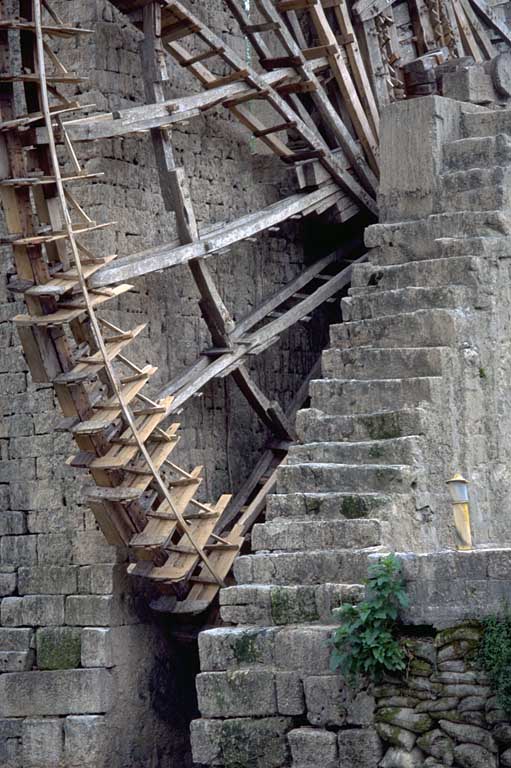
 RSS Feed
RSS Feed